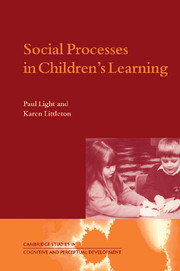
-
Select format
-
- Publisher:
- Cambridge University Press
- Publication date:
- September 2009
- February 2000
- ISBN:
- 9780511489860
- 9780521593083
- 9780521596916
- Dimensions:
- (228 x 152 mm)
- Weight & Pages:
- 0.355kg, 142 Pages
- Dimensions:
- (228 x 152 mm)
- Weight & Pages:
- 0.2kg, 142 Pages
- Subjects:
- Social Psychology, Developmental Psychology, Psychology
You may already have access via personal or institutional login- Subjects:
- Social Psychology, Developmental Psychology, Psychology
Book description
This book, first published in 2000, is about children's learning and problem-solving behaviour. It reflects the increasingly close integration seen in recent years between social and cognitive approaches to researching the learning process. In particular, Paul Light and Karen Littleton examine the ways in which interactions between children influence learning outcomes. They begin by placing this topic in a broad theoretical and empirical context and go on to present a substantial series of their own experimental studies, which focus on children of late primary and early secondary school age. These investigations address peer facilitation of problem solving, social comparison effects on learning and social context effects upon the interpretation of tasks. Many of the studies involve computer-based learning but the findings have implications both for classroom practice and the understanding of the learning process. This book will be a valuable tool for researchers, teachers and practitioners interested in the social processes of children's learning.
Reviews
"The studies presented and discussed have a gentle progession from the simple to the more complex, thus taking along the average reader. The material is compact and scholarly with helpful illustrations. It is well referenced and it is itself a very valuable reference on the impact of social interaction on learning in school age children." The Canadian Child and Adolescent Psychiatry Review
Contents
Metrics
Full text views
Full text views help Loading metrics...
Loading metrics...
* Views captured on Cambridge Core between #date#. This data will be updated every 24 hours.
Usage data cannot currently be displayed.
Accessibility standard: Unknown
Why this information is here
This section outlines the accessibility features of this content - including support for screen readers, full keyboard navigation and high-contrast display options. This may not be relevant for you.
Accessibility Information
Accessibility compliance for the PDF of this book is currently unknown and may be updated in the future.


